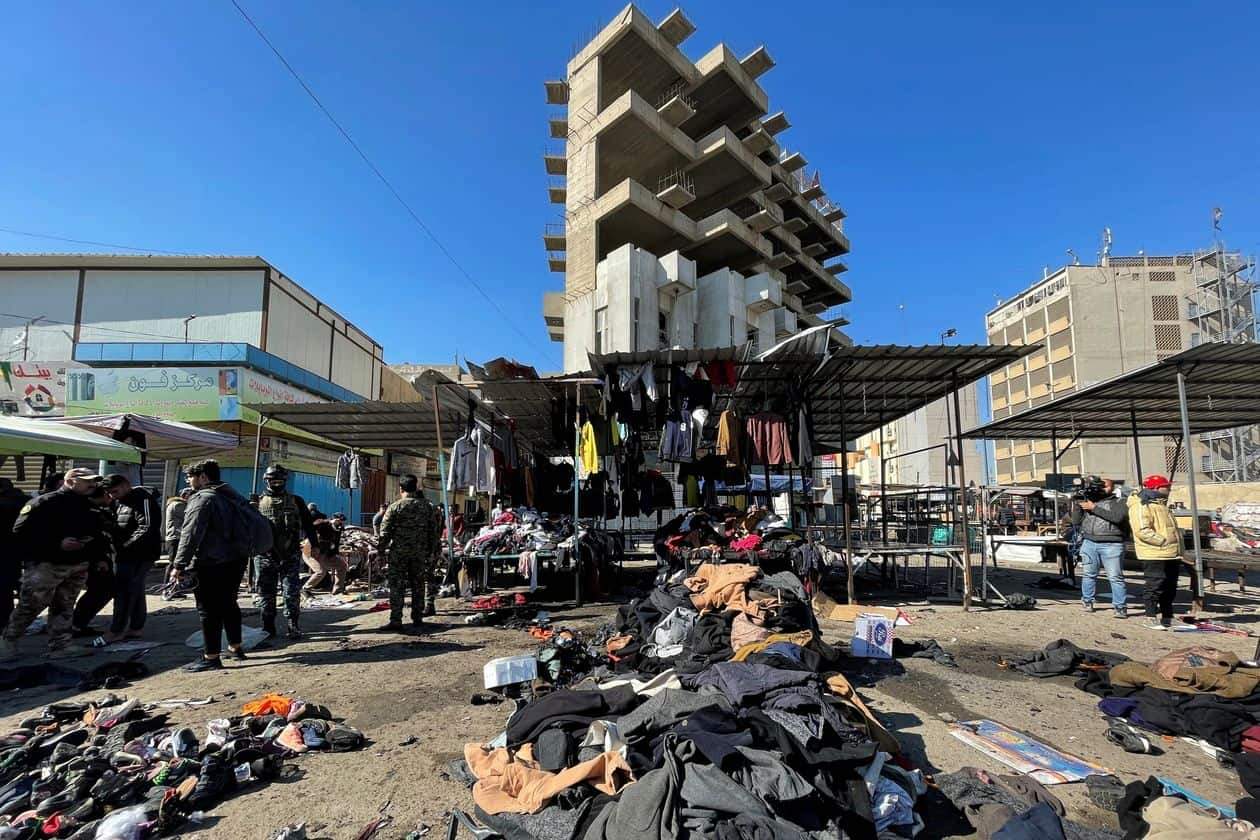Baghdad Bombings Kill Dozens, Highlighting Iraq’s Challenges Amid U.S. Withdrawal

Twin suicide bombings ripped through a crowded marketplace in Baghdad on Thursday, killing at least 32 people and wounding at least 75 others in the first such attack in Iraq’s capital in more than two years.
The explosions shattered a period of relative calm after Islamic State lost the territory it controlled in Iraq and Syria in 2019. The blasts highlight the security challenges facing Iraq after the U.S. withdrew much of its military presence from the country in the last days of the Trump administration.
No group claimed responsibility for the bombing. But it bore the hallmarks of Islamic State, which in the past has carried out lethal bombings targeting civilians throughout Iraq and the wider Middle East.
Iraqi President Barham Salih condemned the attack, saying in a tweet, “The two terrorist explosions targeting innocent people in Baghdad and at this specific time confirms the attempt by the groups of darkness to target all national entitlements and our people’s aspirations for a safe future.”
Yehia Rasool, a military spokesman for Iraq’s prime minister, said Iraqi security forces had received information about the two bombers before the attack and were pursuing them when they blew themselves up. An official statement from Mr. Rasool didn’t include further details about the pursuit of the attackers.
The attack appeared designed to inflict the maximum number of casualties. Iraqi police officials said that minutes after the first blast, a man posing as an injured victim of the attack cried out for help, attracting a crowd of people around him. The man then blew himself up, causing more deaths and injuries, the officials said.
The police officials’ account appeared to conflict with Mr. Rasool’s account of the bombing, suggesting that the second attacker was moving freely in the marketplace and wasn’t being actively pursued at the time of the explosion.
A spokesman for the joint operations command, General Tahseen Al Khafaji, said the second bomber posed as an injured person.
Videos posted on social media and reviewed by The Wall Street Journal showed a crowd of people assembled in the street before the second explosion.
The head of the security and defense committee in the Iraqi parliament, Mohammed Ridha Al Hyder, also disputed Mr. Rasool’s account that the authorities had prior knowledge of the two suicide attackers, saying the bombings represented an intelligence failure.
After capturing huge swaths of Iraq and Syria in 2016, Islamic State collapsed under pressure from a U.S.-led military campaign and from operations by Iran-backed groups in both Iraq and Syria. The group lost control of its de facto capital, Raqqa, in Syria in 2017, and surrendered its last piece of territory in 2019.
The group has survived as an insurgency in remote areas of both Iraq and Syria, and has continued to carry out deadly attacks. Late last year, an ambush on a highway in a government-held area in eastern Syria killed 25 and wounded 13, according to Syrian state media. SANA, the state news agency, said the ambush was orchestrated by terrorists, although it didn’t name Islamic State.
Late Monday, insurgents blew up electricity towers in Iraq’s Diyala province, causing damages amounting to 6 billion Iraqi dinars, equivalent to $4.1 million, according to Iraq’s electricity ministry.
Islamic State controls more than 10,000 fighters organized in small cells in Syria and Iraq, according to a United Nations Security Council report released last year. The group’s militants are able to move freely across the Iraqi-Syrian border, according to the report.
The bombing also demonstrates a challenge facing the administration of President Biden, who took office on Wednesday, as he tackles an array of foreign-policy and security challenges in the Middle East.
President Trump ordered a reduction in U.S. troop levels in Iraq, down to about 2,500 by mid-January of this year. The U.S. previously had more than 3,000 troops in the country as of late 2020. The drawdown was part of Mr. Trump’s desire to end what he called endless wars in the Middle East. Some security experts warned it would hinder military operations designed to maintain pressure on Islamic State.
“This is yet another instance of terrorists killing fellow Iraqis & harms those who seek peace,” said Col. Wayne Marotto, the spokesman for the U.S.-led coalition against Islamic State, in a tweet on the attack.
Photo: A central market in Baghdad was struck by two deadly blasts on Thursday. - PHOTO: THAIER AL-SUDANI/REUTERS
Link: Baghdad Bombings Kill Dozens, Highlighting Iraq’s Challenges Amid U.S. Withdrawal - WSJ




